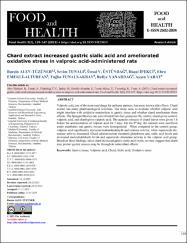Chard extract increased gastric sialic acid and ameliorated oxidative stress in valproic acid-administered rats

View/
Date
2023Author
Tüzüner Alev, BurçinTunalı, Sevim
Üstündağ, Ünsal Veli
İpekçi, Hazal
Emekli Alturfan, Ebru
Tunalı Akbay, Tuğba
Yanardağ, Refiye
Yarat, Ayşen
Metadata
Show full item recordAbstract
Valproic acid, one of the most used drugs for epilepsy patients, has some known side effects. Chard
extract has many pharmacological activities. The study aims to evaluate whether valproic acid
might interfere with oxidative metabolism in gastric tissue and whether chard ameliorates these
effects. The Sprague Dawley rats were divided into four groups (n=8); control, chard-given control,
valproic acid, and chard-given valproic acid. The aqueous extracts of chard leaves were given 1 h
before the administration of valproic acid for 7 days. On the 8th day, the animals were sacrificed
under anesthesia and gastric tissues were homogenized. When compared to the control group,
valproic acid significantly increased malondialdehyde and catalase activity, while superoxide dismutase activity decreased. Chard administration increased glutathione and, sialic acid levels and
decreased malondialdehyde levels and superoxide dismutase activity in the valproic acid group.
Based on these findings, since chard increased gastric sialic acid levels, we may suggest that chard
may protect gastric mucosa may be through its antioxidant effects.
Volume
9Issue
2Collections
The following license files are associated with this item:

















